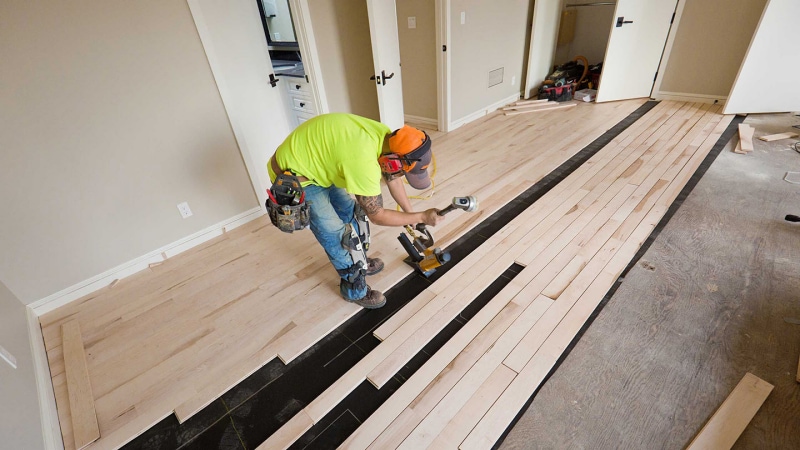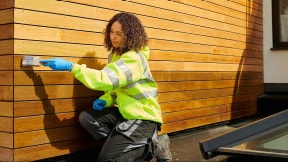Builder's risk insurance: What is it and what does it cover?

The term “builder's risk insurance” might come up at different stages of the homeownership journey. For example, homeowners might encounter it when considering building a new house from scratch or planning some major home renovations. Let's look into builder's risk insurance, what it covers and who may need it.
What is builder's risk insurance?
Builder's risk insurance (also called course of construction insurance) is a type of insurance that covers property and materials during construction or renovation projects. Typically, it may cover new building construction, remodeling or installation of features and fixtures.
Builder's risk insurance can be fairly customizable, and the coverage might depend on the project's specifics and buyer's preferences. Generally, it may protect against risks such as fire, explosions, theft and vandalism.
Who needs builder's risk insurance?
Almost every entity or person with a financial interest in the construction project typically may be allowed to purchase builder's risk insurance. Some common examples of parties that may benefit from it include:
- Homeowners
- Building owners
- Contractors
- Builders
- Engineers or architects
Builder’s risk insurance for homeowners
Some residential property owners may wonder if builder's risk insurance is necessary since they are covered by homeowners insurance. However, the two are not mutually exclusive, each providing its benefits in different circumstances. While homeowners insurance is likely to offer coverage for liability claims, theft and damage to the house, certain issues that could arise during construction may need to be covered separately.
For example, builder's risk insurance could possibly cover a vacant property that's undergoing significant renovations. In contrast, standard homeowners insurance may not offer coverage for homes that were not inhabited for a couple of months.
What does builder's risk insurance cover?
Let's dive into the details to see what standard builder's risk insurance may cover during a project:
- Property damage from various events: Typically, this type of insurance may offer coverage for weather-related damage, such as hail, lightning and natural disasters. Additionally, it is likely to cover the damage caused by explosions and fires.
- Equipment, materials and supplies: Builder's risk insurance coverage could also extend to construction supplies, tools and equipment located on-site, as well as those stolen, damaged or lost in transit. This would be something to discuss with your builder or contractor.
- Documents and data: Similar protection applies to various types of documents, such as blueprints, construction drawings and specifications.
- Financial loss: This type of insurance may possibly cover any losses from the event, as well as construction delays. Examples could include lost rental income, additional interest on loans and real estate taxes.
- Extended coverage: Typically, it may be possible to add certain aspects to tailor coverage to the project's needs. For example, some policies may not cover temporary structures or post-damage cleanup.
Note that builder's risk insurance is not necessary when the property is completed and in livable condition. However, if you do need to choose a builder’s risk insurance policy, your level of coverage will depend on the insurance provider and the chosen plan. That's why it might be helpful to shop around and compare the offers. It may also be helpful to note that, depending on the specifics of your situation, many lenders (including Chase) don’t require you to have builder’s risk insurance upfront.
What doesn’t builder's risk insurance cover?
It may help to identify what risks may not be included in builder's insurance before purchasing the policy. Some common exclusions may be:
- Wear and tear
- Rust and corrosion
- Material defects
- Damage due to faulty design
- Mechanical breakdowns
- Employee injuries
- Employee theft
How much does builder’s risk insurance cost?
There's no one-size-fits-all answer to this question. The cost of the policy may depend significantly on the provider and the type of coverage. Additionally, when the insurance provider determines the quote for builder's risk insurance, they may take into consideration a few factors, such as:
- The type of project: Builder's risk insurance may be used to cover various projects, such as new construction or home remodeling. The exact kind of work could likely impact the final cost of the insurance.
- Location of the project: Certain areas of the country may be more prone to floods, fires or earthquakes, which might affect the policy's price.
- Used materials: The type and cost of the construction materials could also influence the total price. For example, using high-quality, durable materials may result in a slightly decreased quote. However, using high-end, expensive materials can result in a higher cost for the builder's risk insurance.
Who pays for builder’s risk insurance?
Determining the party responsible for purchasing and paying for builder's risk insurance may differ depending on the arrangement, and there is no standard way to approach this subject. Usually, the cost of builder's risk insurance may be included in the total cost of construction. Otherwise, a general contractor may suggest purchasing a policy, but finding a company and paying for the insurance could likely fall on a homeowner.
In summary
Builder's risk insurance may offer protection for buildings, supplies and materials during the volatile period of construction or renovations. These policies are likely to be highly customizable, which allows one to tailor builder's risk insurance to the project’s needs. It may be used by homeowners, general contractors and engineers alike as protection against financial losses and to provide them peace of mind during construction projects.
Builder’s risk insurance FAQs
1. Do you need builder’s risk insurance for renovations?
The answer would depend on the renovation type and the project size. In some cases, homeowners insurance with comprehensive coverage could possibly be enough to cover small jobs. That said, it may be beneficial to talk to a professional to assess your situation.
2. Is builder’s risk insurance required?
Builder's risk insurance is usually not mandated by law; however, local municipalities may require a homeowner or general contractor to purchase it before the start of the project.
3. How is builder’s risk insurance different from homeowners insurance?
While these two policies might have overlaps, they are created for two distinct scenarios. Builder's risk insurance may protect against added risks during construction, while homeowners insurance may not cover most of them since it's designed for day-to-day life at home.



